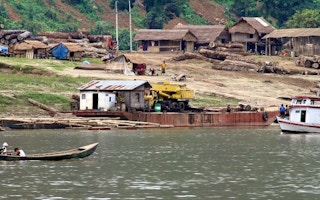Late last month, news reports heralded a new move by the Myanmar government that would ban the logging of all hardwood in the country. However, it now appears that the announcement was more wishful thinking than effected policy, leaving conservationists still clamoring for stronger protection of Myanmar’s shrinking forests.
“We have been reducing timber extraction, and now we have decided to stop logging completely,” said U Saw John Shwe Ba, managing director at Myanmar’s Ministry of Natural Resources and Environmental Conservation, as reported by Reuters on April 28.
“This measure will cover teak and other hardwoods all across the country,” he added.
But it seems like the announcement was not indicative of anything certain. The following week, Shwe Ba told the Myanmar Times he was “90 percent sure” the ban would be enacted.
Later, the Times reported another senior official at the Ministry said logging had not been outlawed outright, and that additional restrictions were only an option at that point.
“Firstly there is no logging ban,” said Environmental Investigation Agency (EIA) Campaigner Faith Doherty. “It’s a statement made by an official but nothing has gone through the legislature or the Ministry. The rumour is that the ban will be addressed for teak only – not other hardwoods.”
Despite a 2014 ban on timber exports out of the country, illegal logging is still a big problem in Myanmar. A 2015 report by the EIA found the Southeast Asian nation still harbored one of the largest illegal timber markets in the world, raking in hundreds of millions of dollars every year.
A big driver of Myanmar’s illegal logging has been China’s demand for rosewood. Also called “hongmu,” rosewood is a particularly lucrative type of timber used to make furniture. Because of the heavy market for it, many rosewood tree species are highly threatened by targeted logging.
The two most sought-after species in Myanmar – tamalan (Dalbergia oliveri) and padauk (Pterocarpus macrcarpus) – stand to be logged into extinction over the course of just a few years, according to a 2014 EIA report.
However, not all news coming out of Myanmar’s logging sector looks bad for the country’s forests. Earlier this year, the EIA reported a downturn in cross-border timber smuggling between Myanmar and China.
The report attributed it to China’s economic slowdown, as well as the country’s crackdown on illegal timber imports and Myanmar’s installment of Aung San Suu Kyi as State Counselor.The post is akin to Prime Minister and was created for Suu Kyi after she won the general presidential election in 2015 but was barred the role by a constitutional technicality.
“
Firstly there is no logging ban. It’s a statement made by an official but nothing has gone through the legislature or the Ministry. The rumour is that the ban will be addressed for teak only – not other hardwoods.
Faith Doherty, campaigner, Environmental Investigation Agency (EIA)
“Illegal logging is out of control in Myanmar, and on top of that there’s a great deal of legal timber extraction,” Bill Laurance, Distinguished Research Professor at Australia’s James Cook University Australia, told Mongabay. “Nobel Laureate and national leader Aung San Suu Kyi deserves a huge amount of credit for cracking down on logging exports, most of which are going to China—whose appetite for timber seems insatiable.”
Despite the recent drop in timber smuggling, deforestation in Myanmar has been scaling upward over the past decade. Data from the University of Maryland show the country’s tree cover loss reached a high in 2014 (the last year for which this kind of data is available), with more than a quarter-million hectares felled in one year alone – totaling an area larger than the U.S. state of Delaware. Tree cover loss alerts indicate 2015 may have exceeded 2014.
Illegal logging isn’t the only driver of Myanmar’s deforestation. Industrial agriculture is having a huge impact on its forests. Oil palm plantations are popping up in the country’s south as the industry expands, with a 2016 study finding palm oil coverage more than doubled in Tanintharyi District between 2002 and 2014.
Another study published last year found rice fields are at fault for nearly 90 percent of Myanmar’s mangrove loss as the country aims to increase its food security.
When it comes to illegal logging, conservationists hope a total ban will lie somewhere in the near future. But in the meantime, they worry that faulty announcements like that purported by U Saw John Shwe Ba may worsen an already bad situation.
“A moratorium on logging would be helpful but it should be a total moratorium,” Doherty told Mongabay. “Secondly, these rumours are currently driving excessive logging – especially for teak in anticipation of a ban there is currently illegal trade of timber including teak that is being smuggled across the Myanmar – China border through Burmese controlled territory as well as the Kachin state where different ethnic armed groups are taxing trucks transporting the timber through their territory.”
As for potential solutions, EIA recommends improving and expanding discourse to include everyone with a stake in the future of Myanmar’s forests.
“The Government needs to have an approach where a multi stakeholder dialogue is used to find solutions to the current situation including ethnic and indigenous views,” Doherty said. “Myanmar has been working toward a possible Myanmar-EU Voluntary Partnership Agreement that would support such an approach.”
Eco-Business published this story with permission from Mongabay.








